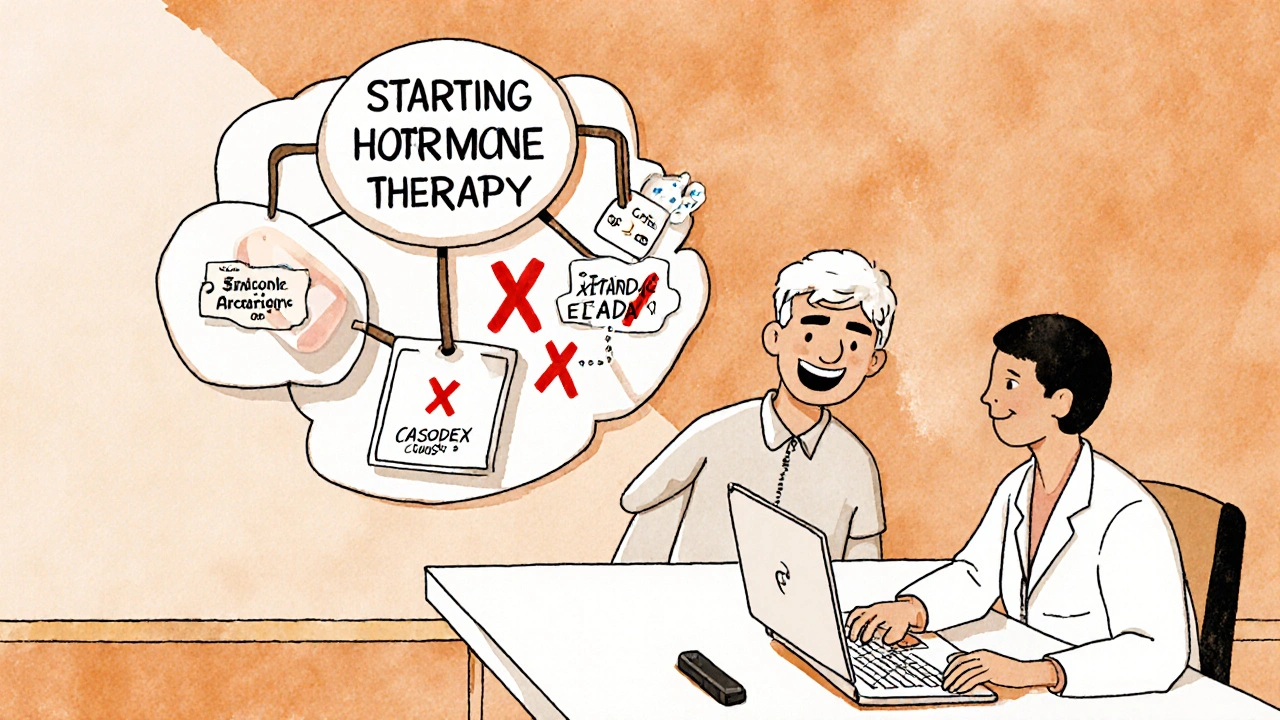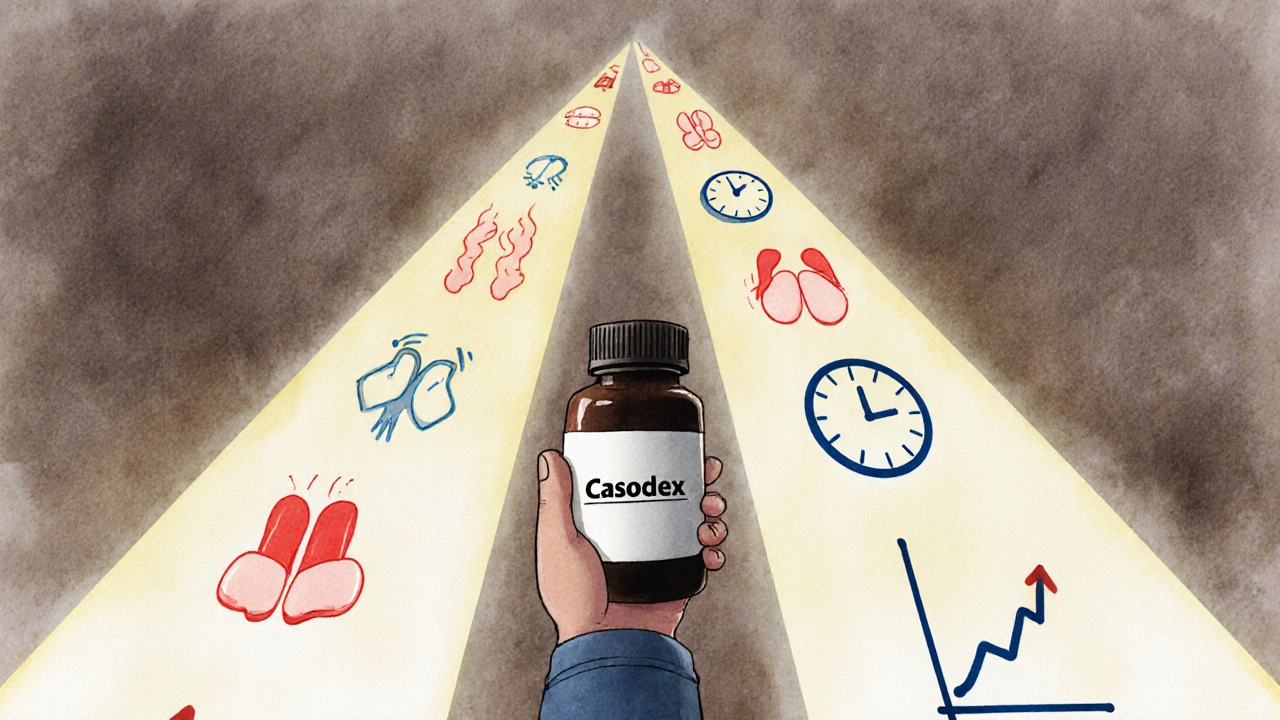Prostate Cancer Treatment Comparison Tool
Compare different prostate cancer treatment options based on key factors like effectiveness, side effects, dosing schedule and cost. Select up to 3 drugs to compare side-by-side.
Select Drugs to Compare
Comparison Summary
Effectiveness
Measures cancer control and survival benefits
Side Effects
Measures common side effects and quality of life impact
| Factor | Casodex | Enzalutamide | Apalutamide |
|---|---|---|---|
| Dose | 50 mg daily | 160 mg daily | 240 mg daily |
| Frequency | Once daily | Once daily | Once daily |
| Breast Swelling Risk | High (up to 30%) | Low (under 10%) | Low (under 10%) |
| Seizure Risk | None | Moderate | None |
| Cost | Low (generic available) | High | High |
| Effectiveness | Baseline | Higher | Higher |
When prostate cancer spreads beyond the prostate, doctors often turn to hormone therapy to slow its growth. One of the oldest and most commonly prescribed drugs for this is Casodex, the brand name for bicalutamide. But it’s not the only option. Over the last two decades, newer drugs have entered the market with different benefits, side effect profiles, and dosing schedules. If you or a loved one is considering treatment, knowing how Casodex stacks up against alternatives can make a real difference in quality of life and long-term outcomes.
How Casodex (Bicalutamide) Works
Casodex is an anti-androgen drug. It blocks testosterone and other male hormones from binding to receptors in prostate cancer cells. Without those signals, the cancer slows down or stops growing. It’s usually taken as a 50 mg tablet once daily, often alongside an LHRH agonist like leuprolide or goserelin, which lowers testosterone production in the testicles. This combo is called combined androgen blockade.
It’s been used since the 1990s and is still widely prescribed because it’s well-studied, affordable, and generally well-tolerated. But it’s not perfect. Common side effects include hot flashes, breast tenderness or enlargement (gynecomastia), fatigue, and nausea. About 30% of men on Casodex develop noticeable breast swelling, which can be uncomfortable and emotionally difficult.
Enzalutamide (Xtandi): A Stronger, Next-Gen Option
Enzalutamide, sold as Xtandi, is one of the most significant advances in prostate cancer treatment since Casodex. Unlike bicalutamide, which only blocks hormone receptors, enzalutamide also prevents testosterone from entering cancer cells and stops the receptor from activating even if it does bind.
Studies show Xtandi is more effective at delaying cancer progression. In the PREVAIL trial, men with metastatic prostate cancer who took enzalutamide lived nearly 8 months longer without their cancer worsening compared to those on placebo. When compared directly to bicalutamide in head-to-head trials, Xtandi showed better tumor control and longer survival.
Side effects are different. While breast swelling is less common than with Casodex, Xtandi increases the risk of seizures (though still rare - under 1%), severe fatigue, and high blood pressure. It also requires strict dosing: 160 mg once daily, taken at the same time every day. It’s more expensive, but many insurance plans cover it for advanced cases.
Apalutamide (Erleada): Another High-Efficacy Alternative
Apalutamide, marketed as Erleada, works similarly to enzalutamide - it blocks hormone receptors more completely and stops them from functioning even when activated. It’s approved for both non-metastatic and metastatic castration-resistant prostate cancer.
In the SPARTAN trial, men with non-metastatic castration-resistant prostate cancer who took Erleada had a 72% lower risk of their cancer spreading compared to placebo. That’s a major advantage for men who want to delay chemotherapy or radiation.
Side effects include rash, fatigue, high blood pressure, and falls (due to dizziness or weakness). Like Xtandi, it doesn’t cause as much breast enlargement as Casodex. The dose is 240 mg once daily. It’s also more expensive than bicalutamide, but some patients qualify for patient assistance programs.
Flutamide: The Older Generic Alternative
Flutamide was one of the first anti-androgens used for prostate cancer. It’s available as a generic, making it the cheapest option. But it’s rarely used today because of its drawbacks.
Flutamide is taken three times a day - 250 mg per dose - which makes adherence harder. It’s also linked to a higher risk of liver damage than Casodex. The FDA issued warnings about severe hepatotoxicity, and regular liver function tests are required. In head-to-head trials, flutamide was less effective than bicalutamide at controlling cancer progression and caused more diarrhea and liver issues.
Unless cost is the absolute top priority and liver health is normal, flutamide is not recommended over Casodex or newer drugs.

Nilutamide: Rarely Used Today
Nilutamide was approved in the 1980s and is now rarely prescribed. It’s taken once daily at 300 mg, but it carries a high risk of serious side effects: lung toxicity, vision changes, alcohol intolerance (causing flushing and nausea), and severe nausea.
Studies show it’s no more effective than Casodex but causes more adverse events. Many oncologists avoid it entirely unless no other options are available. It’s not considered a practical alternative in modern practice.
Comparing the Options: Key Differences at a Glance
| Drug | Brand Name | Dose | Frequency | Common Side Effects | Breast Swelling Risk | Effectiveness vs. Casodex |
|---|---|---|---|---|---|---|
| Bicalutamide | Casodex | 50 mg | Once daily | Hot flashes, fatigue, nausea, breast tenderness | High (up to 30%) | Baseline |
| Enzalutamide | Xtandi | 160 mg | Once daily | Fatigue, high blood pressure, seizure risk (rare) | Low (under 10%) | Higher |
| Apalutamide | Erleada | 240 mg | Once daily | Rash, falls, hypertension | Low (under 10%) | Higher |
| Flutamide | Prostap | 250 mg | Three times daily | Diarrhea, liver damage | Medium (15-20%) | Lower |
| Nilutamide | Nilandron | 300 mg | Once daily | Lung issues, vision changes, alcohol intolerance | Medium (15-20%) | Similar |
Which Alternative Is Right for You?
There’s no one-size-fits-all answer. Your choice depends on your cancer stage, overall health, tolerance for side effects, and financial situation.
If you’re newly diagnosed with advanced prostate cancer and want the strongest possible control with fewer breast-related side effects, enzalutamide or apalutamide are the top choices. They’re proven to extend life longer than Casodex.
If cost is a major concern and you’re in good liver health, Casodex remains a solid, well-tested option. Many men manage its side effects with support - compression garments for breast swelling, medications for hot flashes, or counseling for body image concerns.
Flutamide and nilutamide are outdated. Unless your insurance denies coverage for newer drugs and you have no other options, they’re not worth the added risk.
Some men start with Casodex and switch to enzalutamide or apalutamide if the cancer becomes resistant. This is called sequential therapy and is common in clinical practice.

What About Newer Treatments Like Abiraterone?
You might hear about abiraterone (Zytiga), which works differently - it stops the body from making testosterone altogether, not just blocking it. Zytiga is often used with prednisone and is highly effective, especially after anti-androgens like Casodex stop working. But it’s not a direct alternative because it requires steroids and has different side effects (fluid retention, low potassium, liver stress). It’s usually used after anti-androgens fail, not as a first-line replacement.
For most men starting hormone therapy, the real comparison is between Casodex and the newer anti-androgens: Xtandi and Erleada.
What to Ask Your Doctor
Before choosing, ask:
- Is my cancer hormone-sensitive or castration-resistant?
- What are the chances this drug will delay progression by 6 months, a year, or longer?
- How will this affect my daily life - fatigue, sexual function, risk of falls?
- Is there a generic version? What’s the out-of-pocket cost?
- Will I need regular blood tests or monitoring?
- What happens if this drug stops working?
These questions help you weigh benefits against daily impact. Many men prioritize avoiding breast swelling over slightly better cancer control. Others want the strongest option available, even if it means more fatigue.
Final Thoughts
Casodex isn’t outdated - it’s still a reliable tool. But the treatment landscape has evolved. Enzalutamide and apalutamide offer better cancer control with fewer hormone-related side effects like breast growth. They’re not perfect, but for many men, they’re worth the trade-offs.
If you’re on Casodex and doing well, there’s no rush to switch. But if you’re starting treatment now, or if your cancer is progressing, it’s worth asking your oncologist about newer options. The goal isn’t just to live longer - it’s to live better, with fewer disruptions to your daily life and dignity.
Is Casodex still used for prostate cancer?
Yes, Casodex (bicalutamide) is still used, especially in early-stage hormone-sensitive prostate cancer or when newer drugs aren’t affordable or accessible. It’s often paired with an LHRH agonist. While newer drugs like enzalutamide are more effective, Casodex remains a standard option due to its long safety record and lower cost.
Can I switch from Casodex to Xtandi?
Yes, many men switch from Casodex to enzalutamide (Xtandi) if their cancer starts progressing. This is called sequential therapy. Studies show that switching can still provide benefit, even after prior anti-androgen use. Your doctor will monitor for new side effects like increased fatigue or blood pressure changes.
Do any alternatives to Casodex cause less breast swelling?
Yes. Enzalutamide and apalutamide cause significantly less breast swelling than Casodex - under 10% of users experience it, compared to up to 30% with bicalutamide. This is one of the biggest advantages of newer drugs. Some men also take tamoxifen or radiation to the breasts to prevent or reduce swelling while on Casodex.
Is there a generic version of Casodex?
Yes. Bicalutamide is available as a generic, making it one of the most affordable anti-androgen options. It costs a fraction of enzalutamide or apalutamide, which are still mostly brand-name with limited generics. Generic bicalutamide is often covered by Medicare Part D and Medicaid.
What are the risks of long-term use of Casodex?
Long-term use of Casodex is generally safe, but side effects can accumulate. Persistent hot flashes, fatigue, and breast enlargement are common. There’s a small increased risk of liver enzyme changes, so periodic blood tests are recommended. Unlike some newer drugs, it doesn’t raise seizure risk or cause significant bone loss on its own.
How do I know if my prostate cancer is becoming resistant to Casodex?
Signs of resistance include rising PSA levels despite low testosterone, new bone pain, worsening fatigue, or imaging showing new tumors. Your doctor will track PSA every 3-6 months and may order a bone scan or CT if levels rise. If Casodex stops working, switching to enzalutamide, apalutamide, or abiraterone is the next step.


Oliver Myers
November 1, 2025 AT 23:54Just wanted to say how helpful this breakdown is-seriously, most doctors just hand you a script and say ‘take this.’ You’ve laid out the real trade-offs: breast swelling vs. fatigue vs. cost. I’m on Casodex right now, and the gynecomastia has been brutal, but I didn’t know switching to Xtandi could cut that risk by 2/3. Thank you for the clarity.
John Concepcion
November 3, 2025 AT 19:28LMAO Casodex is still used because it’s cheap and doctors are lazy. You think they care about your dignity? Nah. They care about their formulary quotas and what the rep brought them for lunch. Enzalutamide’s been out since 2012 and they’re still pushing 50mg pills like it’s 1998. Wake up people.
Leslie Schnack
November 5, 2025 AT 16:58What’s the data on switching from Casodex to apalutamide mid-treatment? I’ve heard some men develop rashes or dizziness after switching-is that usually temporary or does it stick around?
Dade Hughston
November 5, 2025 AT 17:22So I’ve been on Casodex for 3 years and my PSA is still under 0.1 but my boobs are bigger than my wife’s and I can’t wear button-ups anymore and my doctor says ‘it’s just a side effect’ like I’m supposed to be proud of it I mean what even is life anymore I just want to go swimming without feeling like a cartoon character
Jim Peddle
November 6, 2025 AT 19:36Let’s not pretend these ‘newer’ drugs are any better. They’re just more expensive because Big Pharma needs to recoup R&D on drugs that do basically the same thing. The real difference? They’re patented. Casodex’s patent expired. That’s why you’re being pushed toward Xtandi. It’s not medicine-it’s capitalism.
S Love
November 7, 2025 AT 22:52Hey everyone-just wanted to share that my dad switched from Casodex to Erleada last year. The breast swelling? Gone in 6 weeks. The fatigue? Managed with light walking and better sleep. He’s been on it 14 months now and his PSA is still undetectable. I know cost is a barrier, but if you’re eligible for patient assistance programs, please, please apply. You’re worth the effort.
Pritesh Mehta
November 8, 2025 AT 08:15In India we don’t even have access to these so-called ‘advanced’ drugs. Casodex is the only option for 90% of patients here. Why does the West act like these are luxury upgrades when for most of the world, even generics are out of reach? This isn’t about efficacy-it’s about global inequality disguised as medical progress.
Billy Tiger
November 9, 2025 AT 20:18Why are we even talking about this? The real answer is testosterone suppression kills your libido and your muscle mass and your will to live. The drugs just delay the inevitable. You’re trading one slow death for another. The only real cure is diet and fasting and sunlight and prayer. All this pharmaceutical nonsense is just distraction
Katie Ring
November 10, 2025 AT 15:33It’s not about which drug is stronger-it’s about which one lets you keep your sense of self. Casodex makes you feel like a man with breasts. Xtandi makes you feel like a man who can’t get out of bed. Neither is a win. The system doesn’t care which side effect you pick-it just wants you to take something.
Adarsha Foundation
November 12, 2025 AT 07:16Thank you for sharing this. I’ve been reading a lot about this lately because my uncle is starting treatment. I’m from India, and I see how hard it is for families to make these decisions without proper guidance. Your comparison table alone could save someone months of confusion. I’ll share this with my family and local support groups.
Caitlin Stewart
November 13, 2025 AT 12:24I’ve been on Casodex for 18 months. I started taking tamoxifen for the breast swelling and it helped-like, a lot. Also compression shirts. Not sexy, but functional. I didn’t know others were doing this. Maybe we should start a thread on coping strategies? Not just drugs, but real daily life hacks.
Emmalee Amthor
November 14, 2025 AT 00:51What if the real question isn't which drug is better-but why we’re forced to choose between side effects instead of getting a cure? We treat cancer like a math problem when it’s a human experience. We need better science, not better brand names.
Alex Sherman
November 14, 2025 AT 21:18Let’s be real-Casodex is the placebo of prostate cancer treatment. It’s the drug doctors prescribe when they don’t want to admit they’re out of ideas. The fact that men are still being told to ‘manage’ gynecomastia like it’s a fashion choice instead of a medical crisis speaks volumes about how little we value dignity in oncology.
Anthony Tong
November 15, 2025 AT 19:54Anyone else notice that every ‘new’ drug has the same exact side effect profile-fatigue, hypertension, falls? The only difference is the price tag. These aren’t innovations. They’re rebranding. The FDA approves them because the trials are funded by the manufacturers. The science is cooked.
Oliver Myers
November 16, 2025 AT 02:20Just got off the phone with my oncologist. We’re switching me to Xtandi next week. I’m nervous, but honestly? I’d rather be tired than feel like I’m growing a second pair of breasts. Thanks to everyone here for the real talk-it helped me ask the right questions.